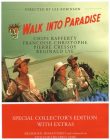

|
BROAD, Guy G.L. CHALLIS (Mrs) (16 September 1984) Widow of Basil Challis.
Our Irish Magistrate in Moresby. Retiring 1966, he returned to Ireland and later moved to England. Employed as architect in PWD in Rabaul pre-war and Moresby post-war.
Resident of Moresby from 1923, Cecily worked in the Government Secretary's office, retiring in 1962.
Died at Balranald. Wife of the late Jack Costelloe, Olive went to Rabaul in 1928 accompanying Jack to many postings, and post-war to Chimbu, Goroka and Lae.
Retired from the Police in 1947, since then living in Queensland. Widow of Percy, ex Police Superintendent.
Died after long illness. Malcolm came to Kieta in 1937 as a Cadet Patrol Officer. During the war, he served with Z Special Unit and was awarded the Military Cross. Returned to field service on various stations, later became Commissioner i/c Corrective Services, retiring in 1971/2. Survived by a daughter & two sons.
Died in Sydney. Perhaps one of New Guinea's best known priests, he first came to Rabaul in 1928. Interned during the war, he remained on the Gazelle peninsula where he did so much to assist ecumenism and co-operation between the churches. He was parish priest at Matupit until he came south for medical treatment just before he died, aged 81.
Died in Sydney, after a short illness. Born in 1927, Father Mike went to PNG in 1956. Greatly respected for his work in education, community affairs and the development of the Madang hinterland at Bundi and then Brahmin, he became a citizen of PNG and was buried at Alexishafen.
Born at Buckhurst Hill, Essex, England on 16 July 1896 and migrated to Australia in 1910 with parents. During WW1 served with the Australian Medical Corps in the 14th General Army Hospital in Egypt. Joined the Australian Administration of the Mandated Territory of New Guinea in 1922 and in 1926 was promoted to Senior Medical Assistant by Dr R.Cilento. During the Second World War he served as a Lieutenant in ANGAU. In 1946 he joined the Civil Provisional Administration of the Territory of Papua New Guinea with the Department of Public Health. In 1958 was warded the OBE for services. He retired from PHD in June 1973. Stan thus had 51 years of continuous service benefitting the people of Papua New Guinea. I was associated with Stan in the Post Second World War Years of the Provisional Administration Public Health Department of PNG, when he was Senior Medical Assistant in company with such others as Bill Thomas, Harry Erskine, L.J. Fisher, Tom Ellis, Norm Walsh—famous names all—but perhaps it was Stan's quiet nature and applied scientific bent that impressed me the most from all of his peer fellows. The story of Stan's life was outlined by himself in an article entitled The Mrs Margaret Spencer, Authoress and Entomologist, detailing the latter years of Stan's career, which did not cease with his official retirement, pays tribute as follows:
These words echo the feelings of all who knew Stan Christian. Stan's brother, Mr Chris Christian, records specific references to his outstanding contributions to the general health services of PNG in the exploratory patrols, establishing of hospitals and in all these activities the abilities of Stan to show his fellow man, by example, the road to a better way of life was exhibited. His workers have succeeded; and those PNG people who stayed by his side have had considerable success. Mrs Danga Goi, MBE, and her adopted daughter Brunie, who is now a qualified Medical Doctor of the University of PNG, together with Stan's old time servant Periarrpi Gawi and his children are living evidence of his ability to assist and guide the people of PNG towards responsible nationhood. Mr Chris Christian relates how in the post war years the Anglican Bishop of New Guinea suggested to Stan that he might join the Church and mentioned the possibility of a having a parish of 5,000 souls to look after. Stan's reply was: "Why should I do that, I now have a district of 70,000 bodies to care for". That was typical of Stan: a very private person with the welfare of humanity foremost in his mind. Professor Donald Dunoon of ANU, Canberra, writes: "What strikes as remarkable about Stan is that he had two distinct careers, first as the "Outside man" of a very peculiar regime in New Guinea, then as the spearhead of the malaria campaign. He acquired such a wealth of information in his first career, that he was invaluable to PHD in the second, that his very relaxed personal style made it easy for him to relate to black and white. In many ways he seems to be almost the characteristic Australian of his generation: not much formal education, boundless curiosity and willingness to learn on the job and always just putting one foot in front of the other". Stanley Hinton Christian, OBE, died at Canberra. A wing of the Wewak Hospital was named the "S.H.CHRISTIAN WING". We honour his memory. Albert Speer
|
